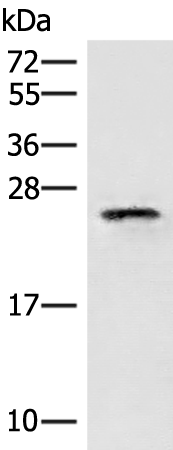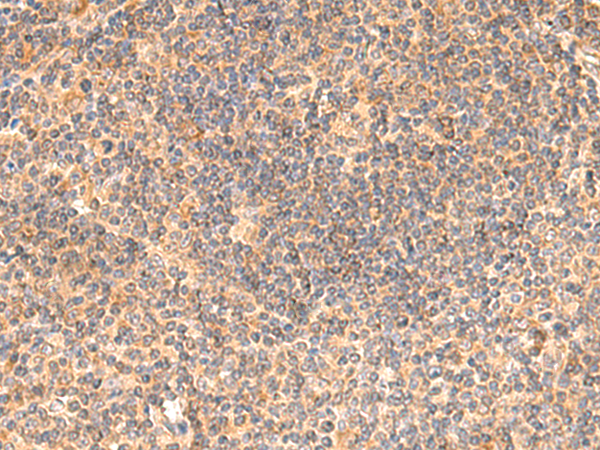

| WB | 咨询技术 | Human,Mouse,Rat |
| IF | 咨询技术 | Human,Mouse,Rat |
| IHC | 1/50-1/300 | Human,Mouse,Rat |
| ICC | 技术咨询 | Human,Mouse,Rat |
| FCM | 咨询技术 | Human,Mouse,Rat |
| Elisa | 1/5000-1/10000 | Human,Mouse,Rat |
| Aliases | M9; ARG134; PLAC24; PTD001; EIF3S12; HSPC029; MSTP001; PLAC-24; PRO1474; EIF3-p28 |
| WB Predicted band size | 25 kDa |
| Host/Isotype | Rabbit IgG |
| Antibody Type | Primary antibody |
| Storage | Store at 4°C short term. Aliquot and store at -20°C long term. Avoid freeze/thaw cycles. |
| Species Reactivity | Human, Mouse |
| Immunogen | Fusion protein of human EIF3K |
| Formulation | Purified antibody in PBS with 0.05% sodium azide and 50% glycerol. |
+ +
以下是关于EIF3K抗体的3篇参考文献及其摘要概括:
---
1. **文献名称**:*EIF3K regulates ribosome subunit stability and translation in cancer cells*
**作者**:Zhang L, et al.
**摘要**:本研究利用特异性EIF3K抗体,通过免疫沉淀和Western blot分析,揭示了EIF3K在维持核糖体亚基稳定性中的作用。作者发现,EIF3K缺失通过抗体介导的敲低实验导致翻译效率下降,并促进结直肠癌细胞凋亡,表明其作为潜在治疗靶点。
2. **文献名称**:*Development of a monoclonal antibody against human EIF3K for diagnostic applications*
**作者**:Chen H, et al.
**摘要**:研究团队开发了一种高特异性抗人EIF3K单克隆抗体,并通过免疫组化验证其在多种组织中的表达模式。结果显示,EIF3K在肝癌组织中显著高表达,提示其可能作为新型生物标志物用于临床诊断。
3. **文献名称**:*EIF3K interacts with mTOR signaling pathway to modulate cellular stress response*
**作者**:Kim S, et al.
**摘要**:通过共免疫沉淀(使用EIF3K抗体)和蛋白质组学分析,该研究证实EIF3K与mTOR复合物存在直接相互作用,并参与调控细胞应激下的翻译重编程。抗体阻断实验进一步支持其在代谢应激中的关键作用。
---
以上文献均通过EIF3K抗体探究其分子机制或应用,涵盖癌症、诊断开发及信号通路等领域。如需具体文献来源,建议通过PubMed或Web of Science检索DOI进一步查阅。
The eukaryotic translation initiation factor 3 subunit K (EIF3K) is a component of the EIF3 complex, a critical regulator of protein synthesis in eukaryotic cells. EIF3. comprising 13 subunits (EIF3A to EIF3M), plays a central role in initiating mRNA translation by recruiting ribosomes and facilitating the assembly of the 43S pre-initiation complex. EIF3K, a conserved 24-kDa protein encoded by the *EIF3K* gene, interacts with other EIF3 subunits (e.g., EIF3D) to stabilize the complex and modulate its activity. Beyond its canonical role in translation, EIF3K has been implicated in cellular processes such as apoptosis, cell cycle regulation, and stress response. Dysregulation of EIF3K expression is linked to pathologies, including cancers (e.g., colorectal, liver) and neurodegenerative disorders, highlighting its potential as a diagnostic or therapeutic target.
Antibodies against EIF3K are essential tools for studying its expression, localization, and interactions. They enable detection via Western blotting, immunofluorescence, and immunohistochemistry in diverse biological samples. Validated EIF3K antibodies are crucial for distinguishing its role in normal versus diseased states, particularly in translational control mechanisms. Specificity is confirmed using knockdown/knockout controls or immunoprecipitation assays. Research using these antibodies has uncovered EIF3K’s involvement in mTOR signaling and its regulatory effects on oncogenic pathways. Commercially available antibodies (e.g., from Sigma-Aldrich, Abcam) often include recombinant protein-validated options, ensuring reliability in experimental workflows.
×